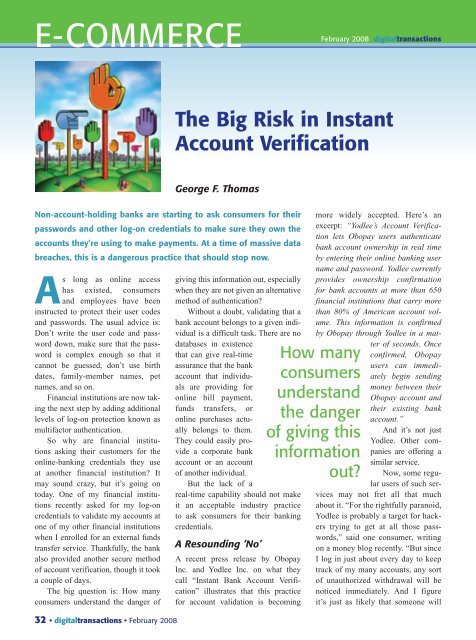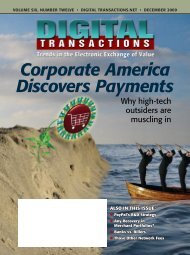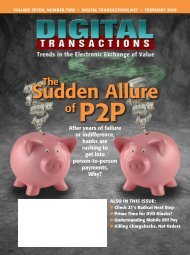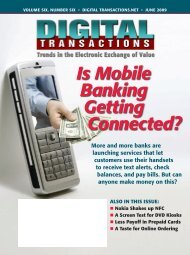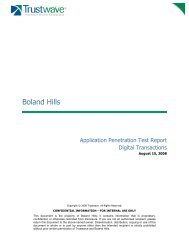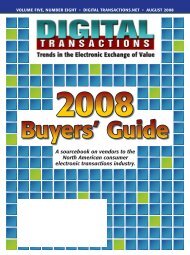The Broken Link - Digital Transactions
The Broken Link - Digital Transactions
The Broken Link - Digital Transactions
You also want an ePaper? Increase the reach of your titles
YUMPU automatically turns print PDFs into web optimized ePapers that Google loves.
E-COMMERCE<br />
February 2008 digitaltransactions<br />
<strong>The</strong> Big Risk in Instant<br />
Account Verification<br />
George F. Thomas<br />
Non-account-holding banks are starting to ask consumers for their<br />
passwords and other log-on credentials to make sure they own the<br />
accounts they’re using to make payments. At a time of massive data<br />
breaches, this is a dangerous practice that should stop now.<br />
As long as online access<br />
has existed, consumers<br />
and employees have been<br />
instructed to protect their user codes<br />
and passwords. <strong>The</strong> usual advice is:<br />
Don’t write the user code and password<br />
down, make sure that the password<br />
is complex enough so that it<br />
cannot be guessed, don’t use birth<br />
dates, family-member names, pet<br />
names, and so on.<br />
Financial institutions are now taking<br />
the next step by adding additional<br />
levels of log-on protection known as<br />
multifactor authentication.<br />
So why are financial institutions<br />
asking their customers for the<br />
online-banking credentials they use<br />
at another financial institution? It<br />
may sound crazy, but it’s going on<br />
today. One of my financial institutions<br />
recently asked for my log-on<br />
credentials to validate my accounts at<br />
one of my other financial institutions<br />
when I enrolled for an external funds<br />
transfer service. Thankfully, the bank<br />
also provided another secure method<br />
of account verification, though it took<br />
a couple of days.<br />
<strong>The</strong> big question is: How many<br />
consumers understand the danger of<br />
32 • digitaltransactions • February 2008<br />
giving this information out, especially<br />
when they are not given an alternative<br />
method of authentication?<br />
Without a doubt, validating that a<br />
bank account belongs to a given individual<br />
is a difficult task. <strong>The</strong>re are no<br />
databases in existence<br />
that can give real-time<br />
assurance that the bank<br />
account that individuals<br />
are providing for<br />
online bill payment,<br />
funds transfers, or<br />
online purchases actually<br />
belongs to them.<br />
<strong>The</strong>y could easily provide<br />
a corporate bank<br />
account or an account<br />
of another individual.<br />
But the lack of a<br />
real-time capability should not make<br />
it an acceptable industry practice<br />
to ask consumers for their banking<br />
credentials.<br />
A Resounding ‘No’<br />
A recent press release by Obopay<br />
Inc. and Yodlee Inc. on what they<br />
call “Instant Bank Account Verification”<br />
illustrates that this practice<br />
for account validation is becoming<br />
How many<br />
consumers<br />
understand<br />
the danger<br />
of giving this<br />
information<br />
out?<br />
more widely accepted. Here’s an<br />
excerpt: “Yodlee’s Account Verification<br />
lets Obopay users authenticate<br />
bank account ownership in real time<br />
by entering their online banking user<br />
name and password. Yodlee currently<br />
provides ownership confirmation<br />
for bank accounts at more than 650<br />
financial institutions that carry more<br />
than 80% of American account volume.<br />
This information is confirmed<br />
by Obopay through Yodlee in a matter<br />
of seconds. Once<br />
confirmed, Obopay<br />
users can immediately<br />
begin sending<br />
money between their<br />
Obopay account and<br />
their existing bank<br />
account.”<br />
And it’s not just<br />
Yodlee. Other companies<br />
are offering a<br />
similar service.<br />
Now, some regular<br />
users of such services<br />
may not fret all that much<br />
about it. “For the rightfully paranoid,<br />
Yodlee is probably a target for hackers<br />
trying to get at all those passwords,”<br />
said one consumer, writing<br />
on a money blog recently. “But since<br />
I log in just about every day to keep<br />
track of my many accounts, any sort<br />
of unauthorized withdrawal will be<br />
noticed immediately. And I figure<br />
it’s just as likely that someone will


